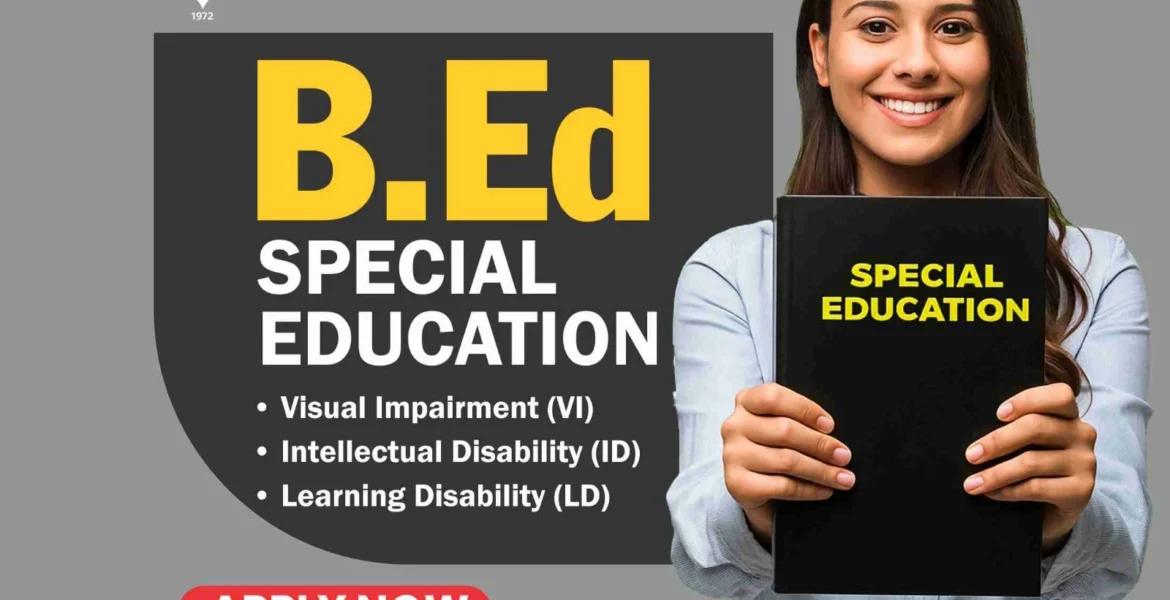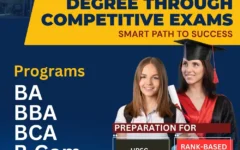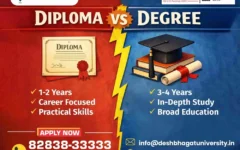B.Ed Special Education in Visual Impairment: A Complete Guide
July 30, 2025 2025-07-30 6:46B.Ed Special Education in Visual Impairment: A Complete Guide

B.Ed Special Education in Visual Impairment: A Complete Guide
The B.Ed. Special Education in Visual Impairment is a degree program for future teachers. It does not help prepare teachers to work well with students who cannot see or have trouble seeing. This program is important for anyone who wants to teach visually impaired students in schools, special education centers, or other learning programs.
In this article, we will explore the details of B.Ed in Visual Impairment, the curriculum, career opportunities, and why Desh Bhagat University (DBU) offers one of the best programs for this specialization.
What is B.Ed Special Education in Visual Impairment?
The Bachelor of Education (B.Ed) in Special Education with a focus on Visual Impairment is a professional course that trains students to work with children who have vision disabilities, ranging from mild visual impairment to complete blindness. The main goal of the program is to provide teachers with the knowledge and tools they need to create effective learning environments for students with visual impairments.
The Importance of Special Education for Visually Impaired Students
Visual impairments make learning harder for children. Without special teaching methods, children with vision problems may find it difficult to read, understand lessons, and take part in school activities. A B.Ed in Visual Impairment teaches teachers how to use special strategies, resources, and tools made for visually impaired students. Using things like Braille, audio books, and other assistive technologies is an important part of helping these students learns.
Why Choose B.Ed Special Education in Visual Impairment?
If you are interested in helping children with vision disabilities, this program is ideal for you. It gives you the skills needed to become a teacher who understands the unique challenges faced by visually impaired students. The program equips you with:
- Knowledge of visual impairments: Understanding different types of visual disabilities and how they affect learning.
- Specialized teaching strategies: Learning how to adapt traditional teaching methods to suit the needs of visually impaired students.
- Use of technology: Gaining expertise in assistive technology like Braille, screen readers, and audio tools that help visually impaired students succeed.
Desh Bhagat University: A Leading University for Special Education
Desh Bhagat University (DBU), located in Mandi Gobindgarh, Punjab, offers one of the top B.Ed Special Education in Visual Impairment programs in India. The university is well-known for its quality education and practical approach to training teachers for special needs education.
DBU’s B.Ed in Visual Impairment is a comprehensive program that blends theoretical knowledge with practical experience. The program is designed to give students a deep understanding of visual impairments and the methods used to support children with these disabilities.
Program Overview
The B.Ed in Visual Impairment at DBU is a two-year undergraduate program, divided into four semesters. This program provides a balanced mix of theoretical learning and hands-on experience. Students are trained in the following key areas:
- Visual Impairment Understanding: Understanding the causes and types of visual impairments.
- Specialized Teaching Methods: Developing teaching strategies for students with visual impairments.
- Assistive Technology: Learning about the tools that help visually impaired students learn, including Braille and screen readers.
- Classroom Management: Techniques for managing diverse classrooms with students of varying abilities.
Year 1: Foundation of Special Education
The first year of the program focuses on building a strong foundation in special education principles and understanding the basics of visual impairments.
Semester 1:
- Educational Psychology: Understanding how students with visual impairments learn involves recognizing that they may rely more on their other senses, like hearing and touch, to process information.
- Philosophical and Sociological Foundations of Education: Learning about the history and importance of inclusive education.
- Introduction to Visual Impairment: A deep dive into visual disabilities, including types, causes, and the impact on learning.
- Human Anatomy and Physiology of the Eye: Understanding the anatomy of the eye and how different eye conditions affect vision.
Semester 2:
- Methods of Teaching Children with Visual Impairment: Developing teaching methods for visually impaired students.
- Educational Technology and Media: Learning how technology can support visually impaired students.
- Curriculum and Instructional Strategies: Adapting curriculum for visually impaired students.
- Assessment and Evaluation in Special Education: Methods for assessing the progress of students with visual impairments.
Year 2: Advanced Training and Practical Experience
In the second year, the program focuses on more specialized training and practical exposure.
Semester 3:
- Inclusive Education and Classroom Management: How to create an inclusive environment where all students can thrive.
- Orientation and Mobility Training: Teaching students how to move around independently.
- Braille Reading and Writing: Learning and teaching Braille, a key tool for visually impaired students.
- Assistive Technology for Visual Impairment: Understanding and using tools like screen readers, Braille displays, and audio devices.
Semester 4:
- Research Methodology in Special Education: Learning how to conduct research in the field of special education.
- Community-Based Rehabilitation: Working with communities to support visually impaired individuals.
- Practical Training and Internship: Real-world experience teaching visually impaired students in schools or special education centers.
- Project Work and thesis: Completing a final project or thesis related to special education and visual impairments.
Career Opportunities after B.Ed in Visual Impairment
Completing a B.Ed in Visual Impairment opens up a wide range of career opportunities. Graduates can work in a variety of settings, including mainstream schools, special education centers, and government organizations. Here are some career paths for graduates:
- Special Education Teacher: Teach students with visual impairments in schools, helping them overcome educational challenges.
- Resource Teacher: Work in regular schools as a resource teacher to support students with visual disabilities.
- Orientation and Mobility Instructor: Teach visually impaired students how to move independently and safely.
- Curriculum Developer: Create teaching materials and resources for visually impaired students.
- Educational Consultant: Advise schools and institutions on how to create inclusive learning environments for visually impaired students.
- Assistive Technology Specialist: Help implement and teach the use of assistive devices that support visually impaired learners.
Admission Process for B.Ed in Visual Impairment at DBU
Desh Bhagat University has an easy admission process for the B.Ed in Visual Impairment program. Here’s how you can apply:
- Eligibility Criteria:
- Candidates must have a Bachelor’s degree in any discipline with a minimum of 50% marks.
- For candidates with a Bachelor’s degree in engineering or technology, the minimum required marks are 55%.
- Application Process:
- Applicants must fill out the application form (https://www.admissions.deshbhagatuniversity.in/).
- Entrance Test (if applicable):
- Some programs may require an entrance exam to assess your aptitude for teaching.
- Interview and Counseling:
- Shortlisted candidates are called for an interview or counseling session.
- Fee Payment:
- Once selected, candidates need to pay the required admission fee to confirm their enrollment.
Skills Acquired in the Program
The B.Ed in Visual Impairment program at DBU provides students with many valuable skills:
- Adapted Teaching Techniques: Learning how to modify lessons and teaching methods for visually impaired students.
- Communication Skills: Understanding how to communicate effectively with visually impaired students and their families.
- Classroom Management: Developing skills to manage diverse classrooms with students of varying needs and abilities.
- Use of Assistive Technology: Becoming proficient in using technology tools like Braille displays, screen readers, and audiobooks.
- Empathy and Patience: Learning to be patient and empathetic with students who face educational challenges.

Why Choose Desh Bhagat University?
Desh Bhagat University (DBU) is one of the leading universities offering specialized education for students interested in special education. Here’s why DBU stands out:
- Comprehensive Curriculum: DBU’s B.Ed Special Education in Visual Impairment program offers a well-rounded curriculum that combines theoretical knowledge with practical experience.
- Experienced Faculty: The faculty at DBU are highly experienced and dedicated to training the next generation of special education teachers.
- Practical Exposure: The program includes hands-on experience through internships, allowing students to work directly with visually impaired students.
- State-of-the-Art Facilities: DBU provides the latest technology and teaching tools to support students in their learning journey.
- Career Support: DBU offers strong career guidance and placement assistance, helping graduates find meaningful employment in the field of special education.
Conclusion
The B.Ed Special Education in Visual Impairment program at Desh Bhagat University is an excellent choice for anyone passionate about making a difference in the lives of visually impaired students. The program provides comprehensive training, practical experience, and all the skills needed to become an effective educator in the field of special education.
Whether you want to teach in schools, develop curriculum, or work in community rehabilitation, this program opens up a wide range of career opportunities. If you’re interested in working with visually impaired students and want to pursue a fulfilling and impactful career, consider applying to DBU for your B.Ed in Visual Impairment.
FAQs
1. What is B.Ed Special Education in Visual Impairment?
B.Ed Special Education in Visual Impairment is a teacher training program that focuses on teaching students who have visual disabilities. It helps future teachers learn how to use different tools, like Braille and assistive technologies, to help visually impaired students learn and succeed in school. It’s a specialized program designed to create inclusive education.
2. Who should apply for B.Ed in Visual Impairment?
Anyone who is interested in working with children who have visual impairments and is passionate about education should consider applying. If you want to help students overcome challenges related to their disability and create an inclusive classroom, this program is a good choice. A background in education or other relevant fields is helpful.
3. What is the duration of the B.Ed Special Education in Visual Impairment program?
The B.Ed Special Education in Visual Impairment program is typically a two-year course. It is divided into four semesters, with each semester focusing on different aspects of teaching visually impaired students. The program includes both theoretical lessons and practical experience to help students develop the skills they need to teach effectively.
4. What are the main subjects taught in the B.Ed Visual Impairment program?
The main subjects include educational psychology, methods of teaching children with visual impairments, Braille reading and writing, assistive technology, inclusive education, and classroom management. Students also learn about the anatomy of the eye, orientation and mobility training, and how to adapt curriculum for visually impaired students.
5. What are the career options after completing B.Ed in Visual Impairment?
After completing the B.Ed in Visual Impairment, graduates can work as special education teachers, resource teachers, orientation and mobility instructors, curriculum developers, or educational consultants. They can work in schools, special education centers, rehabilitation agencies, or even as consultants to help organizations adopt inclusive practices.
6. What are the eligibility criteria for B.Ed Special Education in Visual Impairment?
To be eligible for the program, candidates must have a Bachelor’s degree from a recognized university with at least 50% marks. For candidates with a background in engineering or technology, the required percentage may be higher. Some universities may also require an entrance exam or interview for selection.
7. How is practical training conducted in this program?
Practical training is an essential part of the B.Ed Special Education in Visual Impairment program. Students are given internships in schools or institutions that work with visually impaired students. During this time, they gain hands-on experience, apply their learning, and develop teaching strategies that help visually impaired children.
8. Are there any scholarships available for the B.Ed Visual Impairment program?
Many universities, including Desh Bhagat University, offer scholarships for students who meet certain criteria. These scholarships may be based on academic performance, financial need, or specific background requirements. It’s a good idea to check with the university’s admissions office to learn about available scholarships and eligibility.
9. What is the role of a teacher with a B.Ed in Visual Impairment?
A teacher with a B.Ed in Visual Impairment works to create an inclusive classroom environment where visually impaired students can learn effectively. They use specialized tools, such as Braille, screen readers, and audio books, to ensure that students have access to the same education as their peers. These teachers also adapt lessons and help students with mobility and orientation.
10. How does Desh Bhagat University’s program stand out?
Desh Bhagat University offers a well-rounded B.Ed Special Education in Visual Impairment program that combines theoretical knowledge with practical training. The university has experienced faculty, state-of-the-art facilities, and strong career support. The program ensures that students are fully prepared to work with visually impaired students by giving them hands-on experience in real-world settings.






